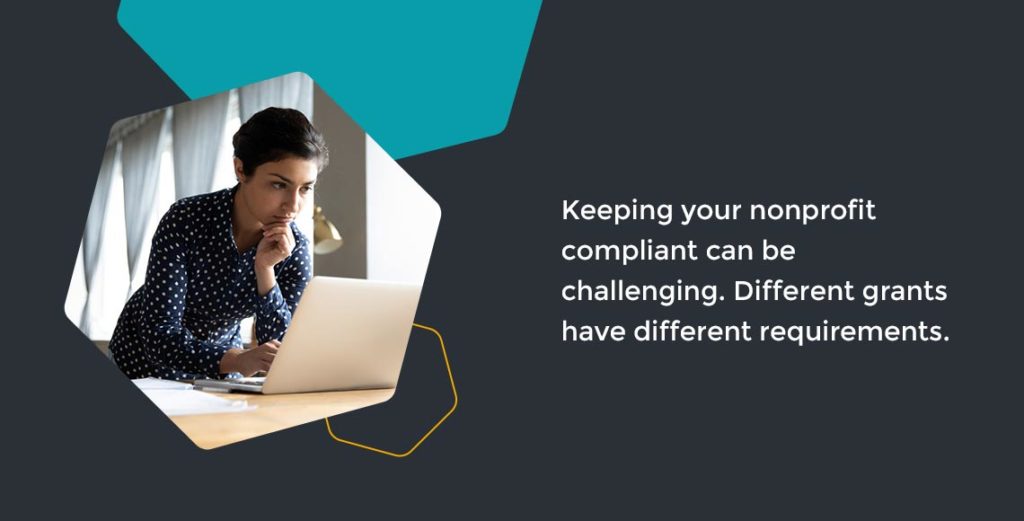Reading Time: 4 minutes
Many types of grants are available for nonprofits, including public and private grants. Public grants refer to grants from federal and state governments, and private grants refer to those awarded from foundations. Each grant has its own requirements when it comes to qualifying and applying for funds. If your organization receives a grant, you must ensure your accounting team stays compliant, receives funds quickly, and can pass a grant audit.
At MIP Fund Accounting®, we can offer you guidance on compliance for nonprofit grant tracking and accounting and what capabilities to look for when accounting for grants.

Compliance for Nonprofit Grant Tracking
Keeping your nonprofit compliant can be challenging. Different grants have different requirements. For example, nonprofits must do the following to account for federal grants:
- Report quarterly and annually on the use of grant funds
- Use the grant funds for their intended purpose
- Have supporting documentation to show the use of funds
- Establish and maintain internal controls
Additionally, auditors and program managers generally want to see the following documents tracked:
- Grant receipts
- Grant-paid invoices
- Bid quotes and records of procurements
- Time and attendance reports for employees
- Payroll expenses, including salary and fringe benefits
- Leases for equipment
- Contractual agreements
Being organized with these records helps when it comes time for audits. Best practices to maximize grant reporting for nonprofits involve adhering to the following guidelines:
- 2 CFR Part 215: Follow these guidelines to receive federal grant funds, including having an Equal Employment Opportunity (EEO) policy in place.
- 2 CFR Part 230: Follow these guidelines to ensure your costs are reasonable, allocable, and allowable. An allocable cost is chargeable to a grant because the expense is specifically for the grant, benefits both the grant and other work, or is necessary to the nonprofit’s operations.
- Federal Register, Vol. 82, No. 155: Follow these guidelines for audit requirements that address what to expect before, during, and after an audit. This includes tracking everything related to your grant by keeping copies of all grant documents, such as receipts, invoices, bid quotes and records of procurement, time and attendance reports for employees, payroll expenses, leases for equipment, and contractual agreements.
Fortunately, staying compliant is easy when you have the right comprehensive, configurable system for grant and financial management, such as MIP Fund Accounting®.
9 Capabilities to Look for When Accounting for Grants
To find the best software to meet your nonprofit’s grant accounting needs, look for these fundamental capabilities:
- Ability to adjust dates and run custom reports: One of the essential capabilities of grant accounting software is the ability to adjust dates and run custom reports for the required grant reporting periods. This means your software must allow you to run reports outside your fiscal year and set specific time intervals and frequencies for reporting. With our core modules, you can create reports customized for your nonprofit and choose from more than 100 templates to get the information you need quickly.
- Ability to attach grant forms within your accounting system: You also need to be able to attach grant forms within your accounting system. With our solution, you can seamlessly attach external files. You can choose the right format and generate grant forms all from the same place within our system.
- Ability to run reports by grant: Nonprofits are dedicating more time to grant reporting today to maintain good funding relationships and access opportunities for new grant funding. This is why the ability to run reports by grant or even across multiple grants is so crucial.
- Ability to view statements of revenue and expenditures: As the name says, your statement of revenue and expenditures contains a revenue section and an expense section. Your revenue minus your expenses is your bottom line, which shows you if your revenue exceeds your expenses or vice versa. With the MIP® budget module, you can easily customize your budget and view revenue and expenditures statements by date.
- Ability to produce balance sheets: With MIP®, you can easily create various reports, including balance sheets, statements of financial position, budget reports, and general ledger reports. If you use several funds, you may be required to produce a separate balance sheet for each fund. Our trusted solution makes this easy and allows you to ensure the money was used for its intended purpose.
- Ability to manage transaction reports: Our software allows you to manage several different types of transaction reports, including invoices, credits, receipts, and manual checks. You can also access a list of sessions for each type of transaction. Other available accounting transactions include budget transactions and cash disbursements. With our dashboards, you can analyze each transaction at the document level and quickly enter transactions when managing your receipts.
- Ability to filter by custom codes: With our solution, you can produce as many budgets as you want, all with the option to set up custom codes that suit your organization’s needs. You can use previous budgets to create new ones, automate your settings, and add comparative columns.
- Ability to run AR billing and choose expense codes: For successful grant accounting, your nonprofit also needs to be able to run AR billing and choose expense codes that tie back to your general ledger codes.
- Ability to run payroll and benefits: Finally, you also want your software to run payroll and benefits, allocating specific hours by grant and using distributions. With MIP People, you can easily manage your team’s payroll and benefits with automated process checklists.
Having software with these capabilities can help ensure your nonprofit is in compliance, which means having a greater likelihood of being awarded grant funds with no fear about whether your organization can pass an audit.
Learn More About Our Grant Administration Module and Reporting Capabilities
At MIP®, we provide nonprofit reporting software that makes it easier to report on grants. Our Grant Administration module allows you to track details related to your grants, such as:
- Grantor name
- Grant period
- Indirect cost rate
- Reporting periods
- Contact information
We offer various services and accounting software modules designed to help your nonprofit manage complex accounting. With more comprehensive financial and grant tracking, you can make informed decisions for your organization, engage donors, and operate more efficiently. Contact us at MIP® to learn more about our Grant Administration module and Reporting Capabilities or schedule a demo of MIP Fund Accounting®.
Share this post






